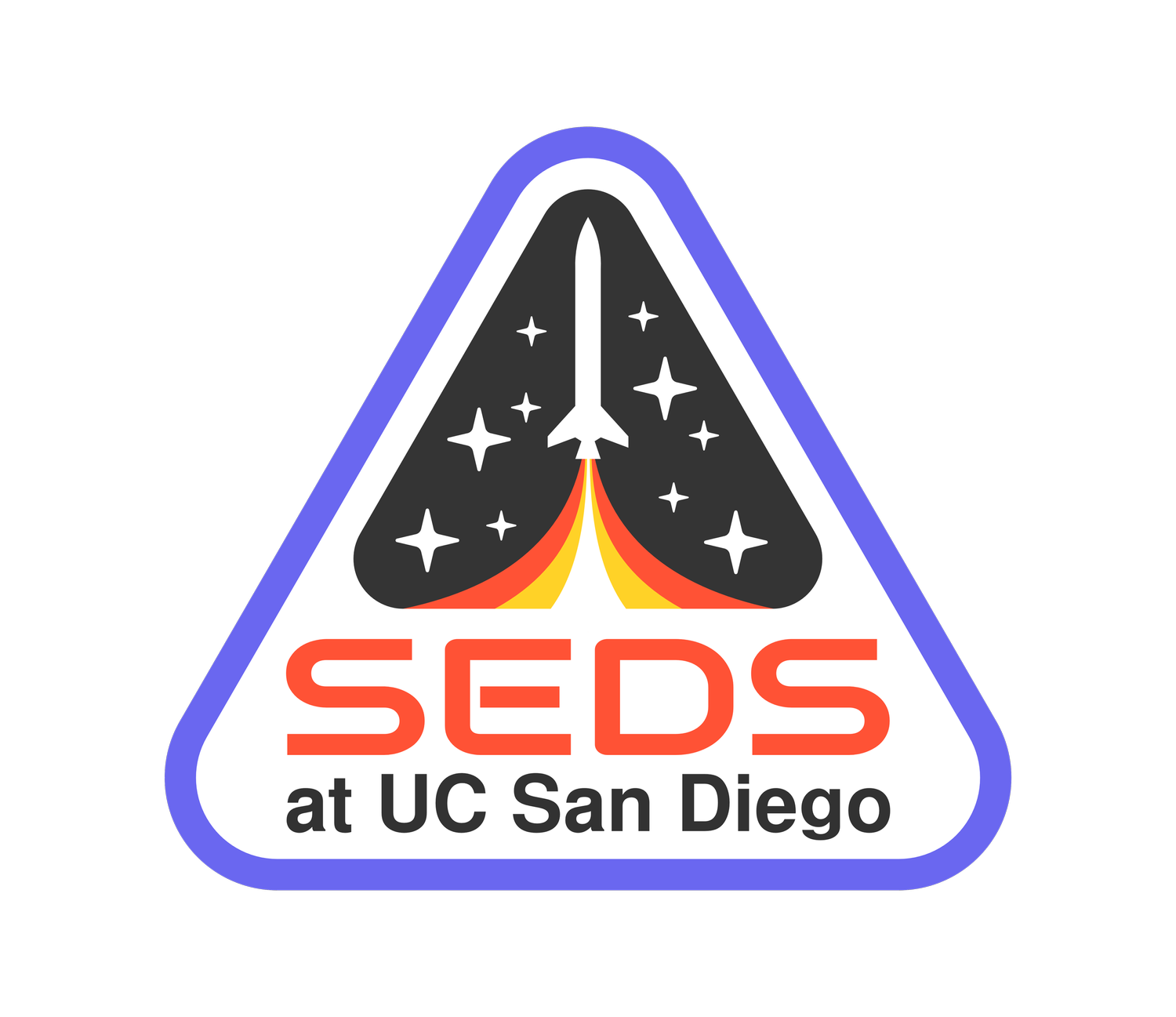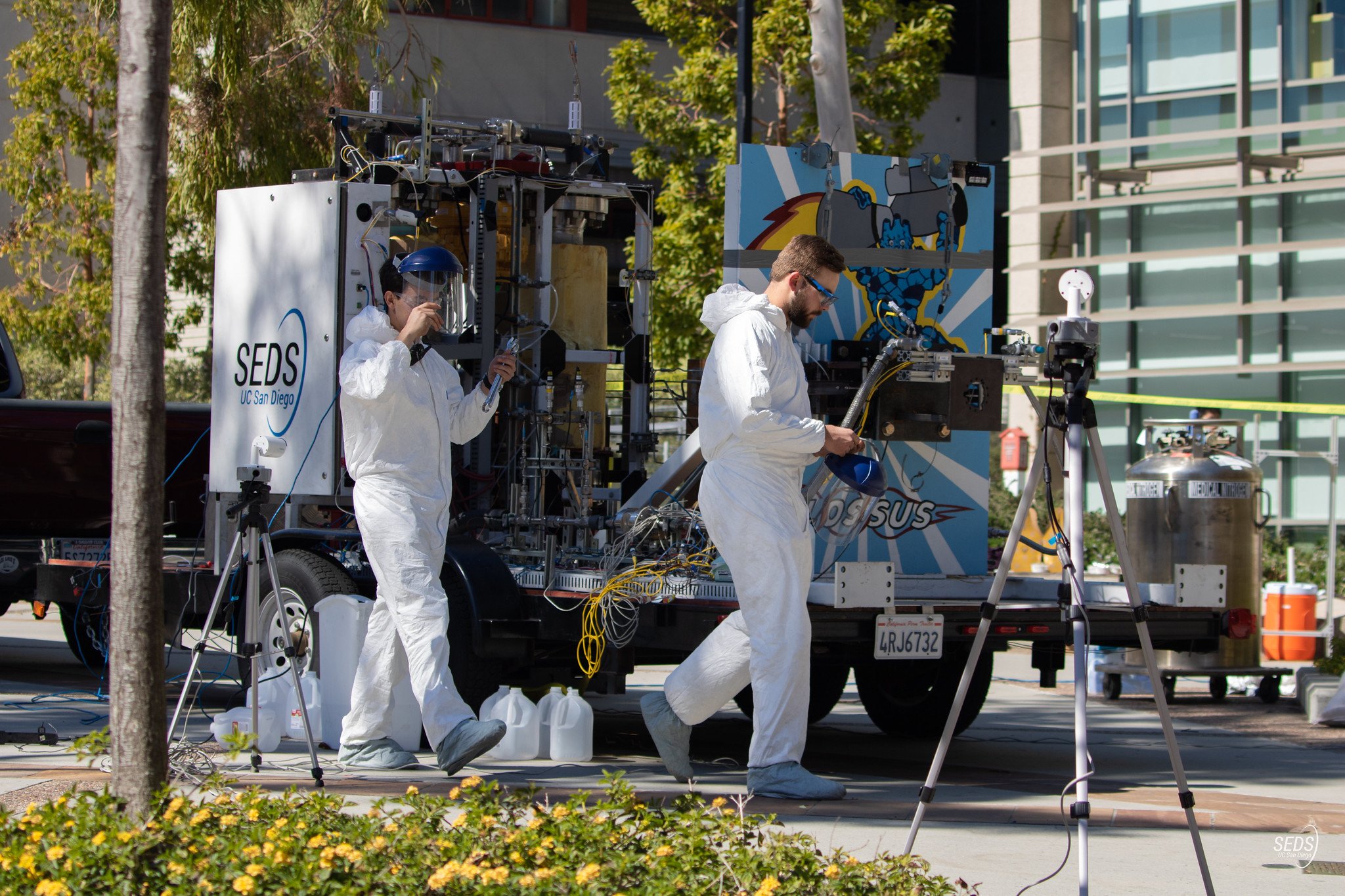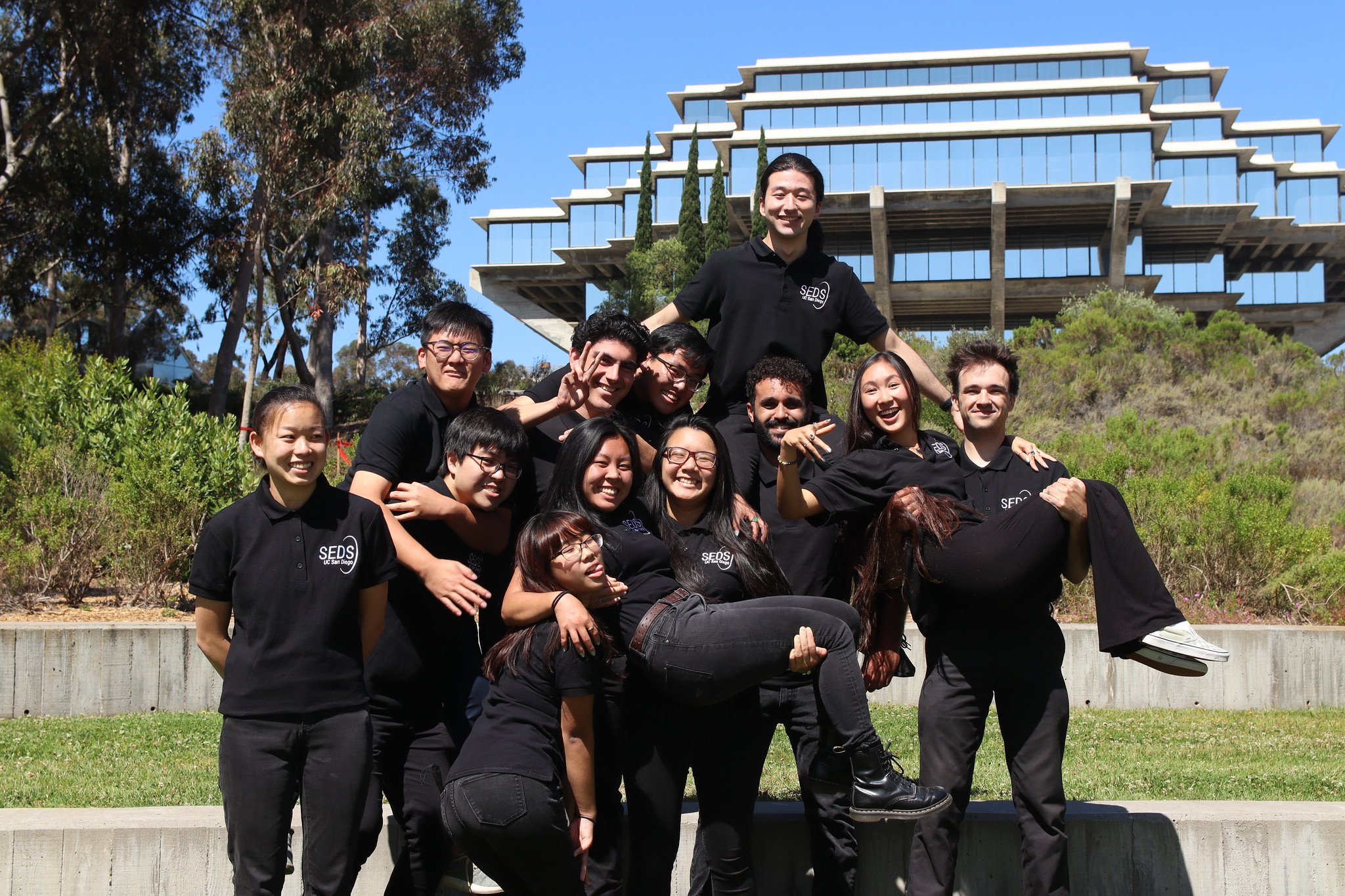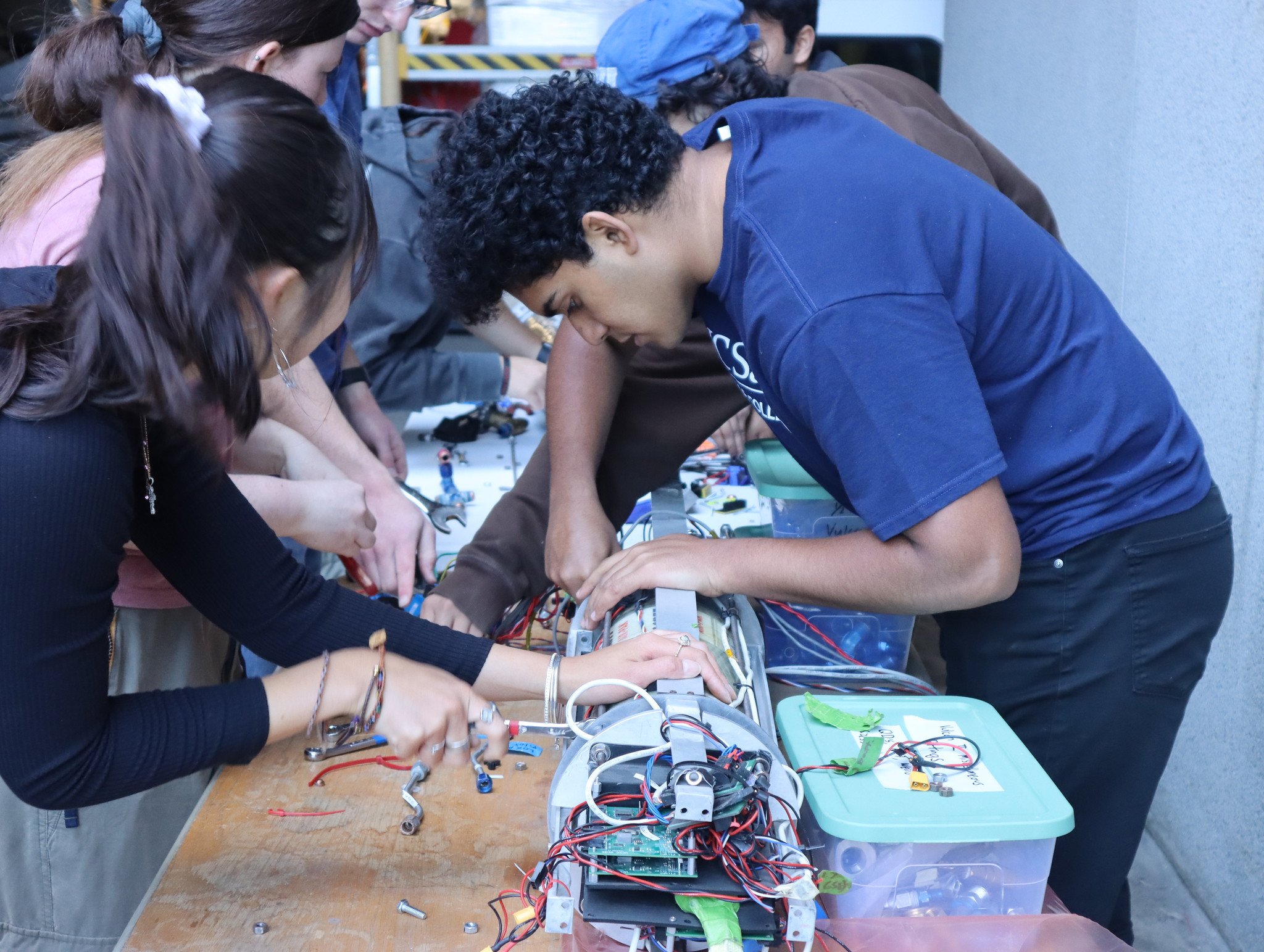
Recruitment
Join us on our journey into the stars!
Applying
Project Team applications for Winter 2026 have closed. Keep a lookout on our socials for the next recruitment cycle. Thank you for your interest.
Tabling Information
Winter 2026
Engineers on the Green (10 AM - 3 PM):
Thursday , January 8th
Make sure to check out our social media for the most up to date information!
SEDS UCSD
SEDS UCSD was founded with the goal of giving students the opportunity to challenge the boundaries of space exploration through engineering. We pioneer industry-level rocketry projects and cultivate leaders in both engineering and business fields, all while performing research that pushes the space industry forward as a whole. We develop some of the most advanced technologies in collegiate rocketry with intense creativity and relentless hard work.
Our Teams
Our organization develops and tests additively manufactured liquid rocket engines, and we design and launch vehicles powered by these engines. Our projects provide students with the opportunity to conduct real aerospace research at a collegiate level, directly preparing them for the industry. Currently, we have four project teams, including the Propulsion and Colossus teams which design and test liquid rocket engines, and the Halya and Riptide teams which design and manufacture next-generation vehicles for flight.
Our Business and Finance team members get real, hands-on experience bringing in some of the biggest names in the industry as sponsors and budgeting our expenses. Our Media and Outreach team publicizes our launches across multiple media platforms, gives back to our San Diego community through tabling events and programs, and works with community partners.
Our mentorship program SEDSxFEMxTR partners with Triton Racing to provide opportunities and a safe space for first-year women and gender minorities in engineering fields. SEDSxFEMxTR organizes its own recruitment process concurrently to the general recruitment for SEDS.
Learn more about each of our teams further below on this page!
About our Process
SEDS UC San Diego holds a general recruitment period once a year in fall. We have a formal recruitment process including mixers, an interview, and a cadetship period. Though fall is our largest recruitment period, additional recruitment happens throughout the year as specific positions open up. Check back at the start of each quarter for more information on our next recruitment period!
About your Application
We recruit for passion, dedication, and the ability to work well in team settings. We want to bring on people who we believe will enjoy themselves and their work in the long term. Technical experience is always helpful, but we know that everyone has the potential to learn given the chance. Thus we encourage you to apply if you are excited to push this field forward and are willing to work hard to make it happen.
Don’t get discouraged if your first application doesn’t land you a spot. Apply, and keep applying! Keep in mind we can onboard a limited number of people each recruitment cycle due to the financial and administrative constraints that come with being a 100% student-led team.
If you have any additional questions, don’t hesitate to contact us!
Project Teams
Propulsion
Our Propulsion team has been designing and testing additively manufactured rocket engines since 2012. Nephas, the latest addition to our engine family, is a copper alloy engine designed for throttling and reusability. Instead of using off-the-shelf solid igniters, our team has designed a torch igniter that is integrated into the engine. Our design cycle requires rapidly analyzing, testing, and iterating on our designs to get to a successful vehicle configuration, which is the biggest benefit of the additive manufacturing technique.
Lander
The Rocket Lander Testbed team works on designing, testing, and iterating self-landing suborbital rocket technology. The current focus of the team is our Riptide lander, which is a 25-foot rocket that will ascend to 1000 ft altitude and land back on the ground by throttling our engine. The Riptide avionics team is currently working on testing their electronic hardware and controls on a sub-scale version of the rocket, while the propellant feed and structures teams work on designing and manufacturing the main body modules, landing legs, propellant tanks, and engine feed system for Riptide.
Atlas
Drawing inspiration from NASA’s groundbreaking Ingenuity mission, the Atlas initiative seeks to introduce cutting-edge advancements in powered flight to aid in the discovery of viable resource and exploration sites on other planets. Our goal is to deploy drones equipped with advanced imagery analysis and sensor systems, to autonomously navigate and detect valuable resources. The ultimate aim is to adapt this technology for use in Martian environments, particularly within cave systems, where traditional methods of exploration are limited. One of the unique aspects of the project is the seamless integration of drones with rovers, establishing a dynamic relay system. We provide a great opportunity for driven engineers, especially in software and electronics, who are willing to research, develop and iterate simultaneously over a year long timeline on a project from conception to conclusion.
Halya
Halya (pronounced “hesh-lah") is a suborbital rocket that will compete in the FAR-Mars collegiate rocketry competition. Halya relies on the copper engine developed by our Propulsion team to launch at supersonic speeds, in hopes of breaking records as the first undergraduate liquid rocket to reach 45,000ft and recover with two-stage parachutes. Unique for its common bulkhead tank that houses its cryogenic liquid propellants, this sounding rocket will also utilize a hybrid strut-aeroshell aerodynamic skin and custom antennas, all manufactured in-house.
Business and Finance
The Business and Finance team works to provide financial stability, record-keeping, and development of sponsorship relations for the entirety of the organization. Through means of budgeting and strategic planning, we guide the organization through the many financial challenges that may present themselves while developing our many aerospace-related projects. Membership within the Business and Finance team offers the ability to develop relevant experience managing finances for multiple projects while simultaneously developing commercial relationships through supply-chain or sponsorship relations. Most importantly, Business and Finance at SEDS at UCSD offers the unique ability to gain business development experience while involving yourself within the ever-growing aerospace industry.
Media and Outreach
The Media and Outreach team works to maintain the online and public presence of SEDS at UCSD at tabling events and through various online platforms such as Instagram, Threads, Youtube, and LinkedIn. The team is ever-growing as we implement new ways to reach out to potential sponsors in tandem with the business team, community leaders, other rocketry organizations, and our vibrant community overall. In this team, we showcase the amazing accomplishments of our technical teams and we give back to our community by tabling and presenting at public-facing events. Students are able to practice skills not commonly found in classrooms such as large public event speaking, community outreach, and social media management, while also growing more conventional skills such as presenting, videography, visual design, and collaboration. We practice these skills while also learning more about the rapidly growing aerospace industry and giving back to our amazingly diverse San Diego community.
SEDS x FEM x TR
SEDSxFEMxTR is a mentorship program opportunity for first year (and select second year) women and gender minorities geared towards increasing the retention of gender minorities in engineering fields. SEDSxFEMxTR exists within SEDS and UCSD’s Formula SAE team Triton Racing where members are accepted alongside their acceptance to the club they apply for. Members are paired up with an older member of their club who will serve as a mentor throughout the year holding weekly one-on-one meetings and weekly community meetings with workshops for professionalism and technical software and hardware skills.
The application for SEDSxFEMxTR can be found here. If you are interested in this program, we encourage you to fill out both the general SEDS application and the FEM application.



